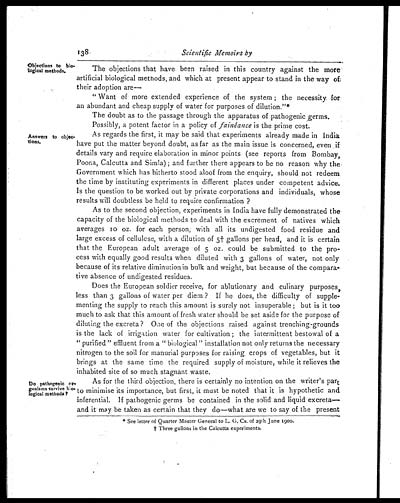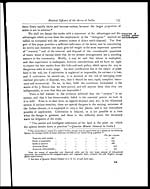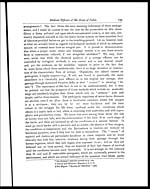Medicine - Institutions > Army health reports and medical documents > Scientific memoirs by medical officers of the Army of India > Part XII, 1901 > 6 - On some practical methods of sanitation in India with special reference to cantonments
(182) Page 138
Download files
Individual page:
Thumbnail gallery: Grid view | List view

138
Scientific Memoirs by
Objections to bio-
logical methods.
The objections that have been raised in this country against the more
artificial biological methods, and which at present appear to stand in the way of
their adoption are—
"Want of more extended experience of the system; the necessity for
an abundant and cheap supply of water for purposes of dilution."*
The doubt as to the passage through the apparatus of pathogenic germs.
Possibly, a potent factor in a policy of fainéance is the prime cost.
Answers to objec-
tions.
As regards the first, it may be said that experiments already made in India
have put the matter beyond doubt, as far as the main issue is concerned, even if
details vary and require elaboration in minor points (see reports from Bombay,
Poona, Calcutta and Simla); and further there appears to be no reason why the
Government which has hitherto stood aloof from the enquiry, should not redeem
the time by instituting experiments in different places under competent advice.
Is the question to be worked out by private corporations and individuals, whose
results will doubtless be held to require confirmation?
As to the second objection, experiments in India have fully demonstrated the
capacity of the biological methods to deal with the excrement of natives which
averages 10 oz. for each person, with all its undigested food residue and
large excess of cellulose, with a dilution of 5 †gallons per head, and it is certain
that the European adult average of 5 oz. could be submitted to the pro-
cess with equally good results when diluted with 3 gallons of water, not only
because of its relative diminution in bulk and weight, but because of the compara-
tive absence of undigested residues.
Does the European soldier receive, for ablutionary and culinary purposes,
less than 3 gallons of water per diem? If he does, the difficulty of supple-
menting the supply to reach this amount is surely not insuperable; but is it too
much to ask that this amount of fresh water should be set aside for the purpose of
diluting the excreta? One of the objections raised against trenching-grounds
is the lack of irrigation water for cultivation; the intermittent bestowal of a
"purified" effluent from a "biological" installation not only returns the necessary
nitrogen to the soil for manurial purposes for raising crops of vegetables, but it
brings at the same time the required supply of moisture, while it relieves the
inhabited site of so much stagnant waste.
Do pathogenic or-
ganisms survive bio-
logical methods?
As for the third objection, there is certainly no intention on the writer's part
to minimise its importance, but first, it must be noted that it is hypothetic and
inferential. If pathogenic germs be contained in the solid and liquid excreta—
and it may be taken as certain that they do—what are we to say of the present
* See letter of Quarter Master General to L. G. Cs. of 29th June 1900.
† Three gallons in the Calcutta experiments.
Set display mode to: Large image | Zoom image | Transcription
Images and transcriptions on this page, including medium image downloads, may be used under the Creative Commons Attribution 4.0 International Licence unless otherwise stated. ![]()
| Permanent URL | https://digital.nls.uk/75005289 |
|---|
| Shelfmark | IP/QB.10 |
|---|---|
| Additional NLS resources: | |




